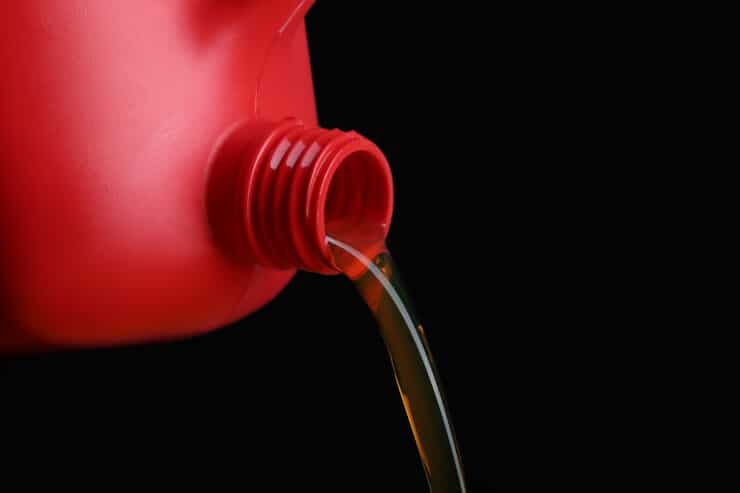Why Is There a Strange Diesel Smell in My House?
If you detect a peculiar diesel odor in your home, it could be a sign of issues with fuel-operated appliances, potential leaks or spills, or even hazardous fumes that could pose a risk to your well-being.

It’s essential to understand the possible causes and consequences of this strange diesel scent so you can act timely to ensure the safety and comfort of your living spaces.
There are some key steps to follow to identify the source of the smell and the appropriate measures to mitigate any risks.
Properly addressing this concern not only alleviates the unsettling odor but can also prevent potential hazards in your home.
Causes of Strange Diesel in House
There are several instances where the reason behind a strange diesel smell in a house can be attributed to a few common causes.
Leaking Storage Tanks
One of the primary causes of strange diesel odors in a home is a leaking storage tank.
Over time, diesel storage tanks can corrode or suffer from other forms of wear and tear, causing them to leak.
If you have an older tank on your property, you should inspect it for signs of damage and leakage.
A leaking tank can emit a strong diesel odor, which can be hazardous to your health and possibly dangerous when it comes to the risk of fire.
According to IndoorDoctor, it’s essential not to delay in testing your home for dangerous fuel odors.
Faulty Plumbing
Faulty plumbing could also contribute to the presence of diesel fumes in your home.
This can occur when fuel-related equipment or pipes connected to a heating system are damaged, corroded, or poorly installed.
We recommend checking your plumbing system for potential leaks, cracks, or any other signs of damage.
Remember that the source of the smell may not always be visible to the naked eye, so don’t hesitate to consult a professional if you’re unable to locate the problem on your own.
Improper Disposal
Improper disposal of diesel is another common cause of strange diesel odors in a residence.
Diesel fuel should never be poured down drains or improperly disposed of in the environment, as it can seep into the groundwater, contaminate soil, and eventually infiltrate your home.
Proper cleaning and remediation are advised, alongside disposing of any remaining diesel fuel according to local regulations and guidance.
Detection and Identification
Visual Signs
Detecting strange diesel smells could be done by observing some visual signs. There are a few things that you should look for:
- Unusual color or clarity: If the diesel appears to be dyed a different color or looks hazy, it may be a sign of contamination or tampering.
- Presence of sediment or debris: Check for the presence of sediment or other debris in the diesel as it may indicate poor storage or handling practices.
Odor and Physical Characteristics
To further identify strange diesel, pay attention to the odor and physical characteristics of the fuel. Some common indicators include:
- Unusual smell: Diesel has a distinct and strong odor. If you notice a significantly different smell, it could be a sign of contamination or adulteration.
- Slick or oily texture: Diesel should have a relatively uniform texture. If it feels unusually slick or oily, it may be mixed with other substances.
In some cases, advanced testing methods such as chromatography-mass spectrometry could be employed to detect and identify fuel fraud on the spot.
In Northern Ireland, the government has even fitted portable GC-MS fuel fraud detection units into their vehicles.
This has allowed enforcement officers to detect illicit fuel quickly and efficiently.
Health and Environmental Risks
Hazards to Human Health
Exposure to diesel exhaust can lead to serious health conditions.
Examples of these bad effects are asthma and respiratory problems. These can worsen existing conditions most especially among children and older people. [source].
Diesel exhaust is more than just an unpleasant, lingering smell.
It is a complex mixture of thousands of gases and fine particles containing over 40 toxic air contaminants, such as benzene, arsenic, and formaldehyde [source].
These harmful substances can lead to issues like worsening asthma, allergies, bronchitis, and lung function, as well as the risk of heart problems, premature death, and lung cancer [source].
Environmental Dangers
Not only is strange diesel harmful to our health, but it also poses significant threats to the environment.
Diesel exhaust pollution includes soot or particulate matter (PM), oxides of nitrogen (NOx), hydrocarbons (HC), carbon monoxide (CO), and other hazardous air pollutants (HAPs) and air toxics [source].
These pollutants contribute to various environmental issues such as the production of ground-level ozone (smog) and acid rain.
In California, diesel particulate matter (DPM) has a significant impact on the state’s population.
In fact, it is estimated that DPM accounts for about 70% of the causes of cancer-risk-related air toxins.
It is estimated that DPM increases statewide cancer risk by 520 cancers per million exposed individuals based on 2012 exposure data [source].
Addressing the Issue

It’s crucial to address the issue promptly to protect your family’s health and maintain the home’s integrity.
Here are the immediate steps you can take and the professional remediation to seek to resolve the problem.
Immediate Steps
Upon discovering the unusual diesel presence, your first concern is to mitigate any potential harm.
Open the windows and doors to ventilate the area, allowing fresh air to disperse the fumes.
Turn off any ignition sources, such as gas stoves and electrical appliances, to minimize the risk of combustion.
Next, inspect the heating system and any diesel-fueled devices in the house to check for leaks or malfunctions.
Make sure to note any irregularities, such as discolored walls, wet spots on the floor, or corroded components.
Also, don’t forget to listen carefully for any persistent humming noises, which could indicate issues with the diesel generator (source).
Professional Remediation
You can also ask the help of professionals to remediate the situation.
Contact certified HVAC experts who specialize in dealing with diesel-powered systems.
They can perform a thorough assessment of your home and identify the root cause of the strange diesel presence.
The professionals can address any potential hazards and conduct necessary repairs.
For example, clogged air filters or vent pipes may have led to unhealthy exhaust fumes circulating in your home (source).
They can also advise you on maintenance practices to prevent similar problems from arising in the future.
Prevention and Maintenance
Proper Storage
In order to ensure the safety and longevity of diesel at home, it’s essential to properly store it.
Always store your diesel in a clean, dry, and well-ventilated area, away from any sources of heat, flame, or sparks.
This minimizes the risk of combustion and helps maintain the quality of the fuel.
When it comes to containers, make sure to use approved diesel storage containers, which are specifically designed to withstand the chemical properties of diesel and prevent leaks.
It’s also crucial to avoid overfilling containers, as diesel can expand under certain conditions, increasing the risk of a leak or spill.
Leave some space at the top of the container to accommodate any expansion that may occur (Motor Verso).
Regular Inspections
Another essential aspect of diesel fuel prevention and maintenance is conducting regular inspections of storage areas and containers to check for any visible signs of leaks, cracks, or damage.
If a leak is found, it’s important to address it immediately to prevent further fuel loss and potential hazards.
Regularly inspect the fuel for signs of contamination.
Diesel fuel is prone to degradation over time, with Bell Performance stating that it can degrade up to 26% in the first 28 days.
To prevent contamination from microbial growth, it is important to minimize the presence of water in the storage area and make sure the storage container is properly sealed (ISSAA).
Maintaining your diesel engine is also very important to ensure its longevity and performance.
Some of the key maintenance tips you can follow include:
- Allowing the engine to cool down after each trip.
- Putting the vehicle in neutral when making a final stop.
- Maintaining moderate RPMs to protect the engine and gearbox from vibrations.
- Regularly cleaning diesel filters to improve fuel efficiency and reduce contaminants (GoMotive).







